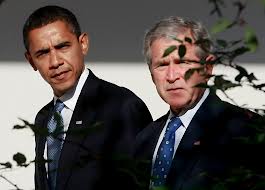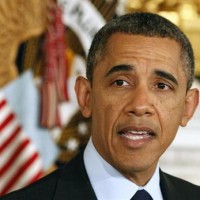Accusing President Obama of “caviling over chemical weapons in Syria,” The Economist insists that events in Syria are “exposing Mr Obama’s hubris,” his “overconfidence,” and revealing his foreign policy ineptitude. President Obama, says The Economist, “is cautious to a fault, placing more weight on the costs of action than of inaction.” The chemical weapons “red line” should have provoked a severe American reaction; President Obama’s prudence and “lawyerly dispassion,” however, have callously vetoed such a response.
The Economist’s Syria rhetoric might be more convincing if it did not eerily resemble its 2003 rhetoric with which it voted for war in Iraq. Then, as now, the threat was “a brutal, ruthless dictator.” American credibility was on the line. Would we let this dictator disregard the demands of the U.N.? No. “To wait was too risky.” Never mind that wavering American commitment in Afghanistan had left the country “in far too vulnerable and disorderly a state,” and that “if the same were to happen in Iraq the result could be catastrophic . . . and a huge stain on America’s reputation, not only for justice but also for effectiveness.” It was time to take a new dictator down.
Ten years later, The Economist’s Democracy in America blog remembered the “Anniversary of a Mass Delusion.” The legacy it commemorated?
Thousands of American soldiers died in a war in Iraq that only exacerbated the danger of anti-American terrorism. Thousands of Iraqi soldiers died as well, and hundreds of thousands of Iraqi civilians died in the resulting civil war, most killed by the Iraqi militias who emerged in the power vacuum the US invasion created, but many killed by US armed forces themselves. In the name of pre-empting a non-existent threat, America killed tens of thousands of people and turned Iraq into a breeding ground for terrorism. And we spent a trillion dollars to do it.
Somehow, this legacy has not humbled The Economist, and the magazine does not think it should humble American foreign policy either. One decade ago if America would have had a president who (in The Economist’s words) “would not rush to judgment,” a president who would call “for more clarity,” a president who would worry “that the robust intervention . . . might only make things worse,” a president who placed “more weight on the costs of action than inaction,” a president who rejected “dumb wars” based on uncertain intelligence, a president who understood that international relations is choosing between bad and worse and that the world is a tragic place from which evil cannot be eradicated, the story of our failed escapades in the Middle East might have been entirely different. And now that we have such a president? Oh, humbug: such insistence on caution, prudence, and clarity is naïve, coldhearted, and contrary to American interests. It’s time to take a new dictator down. The Economist, having put Iraq behind itself, seems interested in resurrecting the foreign policy of George W. Bush.
Jared McKinney studied history at Patrick Henry College and is a graduate student in defense and strategic studies at Missouri State University (Fairfax, VA).






9 comments
Jeffry Butter
Jared .. this is excellent work in exposing the logical inconsistencies of The Economist. I admit however, that I hate how easily people write and quote clever sentences about casualties in Iraq without citing legitimate sources. And I think we can have a legitimate discussion about the responsibility to stop mass murder and genocide and whose responsibility that is.
Siarlys Jenkins
The Economist makes a most convincing case that bad things are happening in Syria, many people are being killed, there is a significant chance that evil people will become stronger and wreak much havoc… but what calls the gentle reader back to sanity is the remembrance that when we heed such siren calls, all our boots on the ground don’t seem to make things better, and often make them worse, for us, and for the people who have the misfortune to live in the country we’ve just invaded.
If we were willing to make the kind of commitment required to invade, conquer, hold, and utterly reshape Germany after World War II, we MIGHT succeed. Short of that, we had best not flatter ourselves about the likely results.
Jack
I agree with Obama’s hesitancy to enter the Syrian conflict (although, to be fair, we have entered that conflict indirectly and we have picked a side). But Obama has shown no hesitancy to march into other nations without really thinking about the consequences. The war on terror will never end because it is hitched to a foreign policy which inspires more terrorism. And we can’t change our foreign policy narrative because to do so would mean accepting the idea of blowback, and that means accepting some responsibility for fanning anti-western hate, and that means questioning US exceptionalism. And to do that is political suicide. So we are stuck in a spiral of self destruction.
JimWilton
If I thought much about it, I expect I would disagree with the Economist’s criticism of Obama’s reluctance to start a new war.
However, it is simply wrong to view the Economist’s position on Bush’s war in Iraq and Obama’s foreign policy in Syria as inconsistent.
Bush’s premise for the war in Iraq (to the extent that you take it at face value) was invalidated by its reliance on faulty intelligence and its erroneous conclusions. It is possible, of course, to view Bush’s actual motives for war as different from the premise on which the war was sold to Congress and the American public. But either way, Syria is a very different situation and the Economist has a principled basis for taking a different view of Obama’s Syrian foreign policy.
c
“One decade ago if America would have had a president….”
“One decade ago if America HAD had a president….”
Otherwise, smart article.
Charlieford
Brits that lean conservative always encourage America to take up the imperial mantle. They can’t help themselves.
David Naas
Or, perhaps War is the Health of the (Corporate) State, and *The Economist* is a cheerleader, not for Capitalism, but for Corporatism?
James
It’s no surprise that the Economist endorses a foreign policy that aggressively advances democratic causes. However misguided that policy may be, the columnist correctly identifies flaccidity and inconsistency in U.S. foreign policy. We have whiggish rhetoric with half-hearted support. We have red lines with no apparent consequences. And we have aspired to humanitarian intervention in Lybia but not Syria. In short, we still seem to pursue the aspirations of the Bush years without the same political will. Perhaps the column stikes home because not all that much has changed.
Robert
Lord save us from having to learn the lesson that, “evil cannot be irradiated.”
Comments are closed.